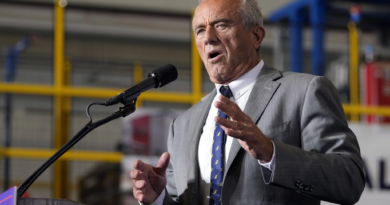The narrative of Bidenomics isn’t sticking because it doesn’t reflect Americans’ lived experiences
Political pundits are scratching their heads trying to figure out why so many people report that they are feeling economic hardship at a time when many of the standard economic measures are strong. By most traditional accounts, the U.S. economy is in excellent shape. But the average American’s confidence in the economy has been plunging to numbers not seen since 2008.
Our research on organizing to advance big, transformative change teaches us two insights.
First, we need to help people make sense of their world, not tell them what to think. That means listening closely to people’s experiences. If they’re afraid they can’t pay their bills, we need to help them make sense of that lived reality. That starts by taking that lived reality seriously, not just telling people things are fine.
When we listen to people, it becomes clear that aggregate statistics no longer reflect the reality most people live in. Unemployment may be low, but if you can only find work at low wages and irregular hours, things aren’t fine. Inflation may be dropping, but if your paycheck no longer covers your rent (the way we measure inflation doesn’t adequately capture housing costs), things aren’t fine. If you’re two percent better off than last year, but you were on the edge of disaster last year, things aren’t fine.
We need to talk about that reality–economic inequality, corporate power, and economic insecurity.
Second, extreme inequality and massive corporate power have led to a crisis. In times of rupture, when old systems are dying out or becoming unstable, we can’t rely on business as usual. We cannot rely on policymaking as the sole or even the main lever for change. For instance, raising minimum wages has helped a lot of people with their monthly bills–but without a union, employers can still cut your work hours, discipline you, or fire you unfairly. The Child Tax Credit had a huge impact on reducing child poverty–but as many low-income parents suspected, it was only a matter of time before it was taken away.
Corporations have more power today than they’ve had for over 100 years–or perhaps ever, given the amount of wealth and resources they control. The rules of the game are still skewed in their favor. They’ve raised the prices of our basic goods because they can. They’ve limited our housing supply because they can. They’ve refused to comply with basic employment laws because they don’t have to.
Winning real improvements that help working people requires disrupting corporate power. Strategic disruption is the “power to wound,” stopping those with enormous power from unchecked use of their influence. We need to be changing the rules of the game so that corporations don’t have the power to increase profits at the expense of people and the planet or influence politicians to do their bidding.
Working people can take actions such as strikes or boycotts to upset the status quo. But importantly, the gains must then be institutionalized in ways that permanently redistribute power towards workers, consumers, and the environment. Wins can be institutionalized by winning collective bargaining agreements, changing laws, or enforcing existing laws.
There are key examples of progress. In 2023, the United Auto Workers (UAW) showed how when workers take disruptive, surprising action together, they can win massive gains. The Inflation Reduction Act included new changes to tax law and the ability to enforce them. New rulings at the National Labor Relations Board will make corporations more likely to abide by labor law, at least somewhat. But we need more than a collection of technical fixes.
It’s time to disrupt corporate power and to help people make collective sense of why they continue to suffer.
Deepak Bhargava and Stephanie Luce are the co-authors of the just-published book, Practical Radicals: Seven Strategies to Change the World.
More must-read commentary published by Fortune:
- Economic pessimists’ bet on a 2023 recession failed. Why are they doubling down in 2024?
- COVID-19 v. Flu: A ‘much more serious threat,’ new study into long-term risks concludes
- Access to modern stoves could be a game-changer for Africa’s economic development–and help cut the equivalent of the carbon dioxide emitted by the world’s planes and ships
- ‘Parroting Putin’s propaganda’: The business exodus over Ukraine was no Russian bonanza
The opinions expressed in Fortune.com commentary pieces are solely the views of their authors and do not necessarily reflect the opinions and beliefs of Fortune.




